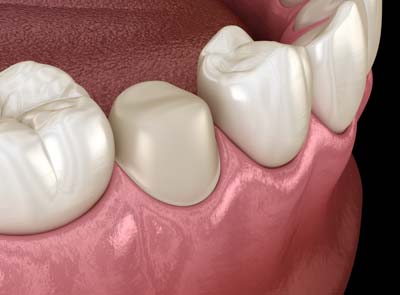Do You Always Need a Crown after a Root Canal?

Typically when you hear of someone getting a root canal, the next step is a crown. For a root canal, the dentist first makes a small hole on the surface of the tooth. They then remove all the damaged pulp before cleaning the inner tooth to remove any remaining debris. Finally, the dentist seals the tooth with a filling or some other dental restoration; a crown, maybe.
Why getting a dental crown after a root canal is a good idea
A root canal may save a tooth from further infection, but it does not save the tooth from weakening. Coupled with tooth decay, a root canal procedure weakens the tooth by reducing the amount of healthy tissue within it.
To stop the tooth from disintegrating, a dentist will recommend restoring the tooth with a dental crown. A dental crown is needed after a root canal:
1. When the tooth becomes weakened
Tooth decay as well as having a large amount of dental tissue removed during a root canal weakens a tooth. Combined, decay and a root canal will leave the tooth at risk of crumbling when subjected to the pressure of chewing and grinding.
A crown will cover the tooth, reinforce its outer structure and keep it from crumbling.
2. When the tooth becomes sensitive
Sometimes, only part of the pulp needs to be removed during a root canal. Whatever remains may be extremely sensitive to heat, cold, pressure, acid and sugar. Fitting a crown covers the tooth and protects it from the elements.
3. When the tooth becomes discolored
Tooth decay or a root canal may cause the tooth to become discolored. In such a case, a crown should be placed for cosmetic reasons.
4. When a tooth has been restored before
If a root canal is performed on a tooth that had already been treated for tooth decay, then chances are high that the tooth will have another issue in the future. Placing a crown covers the tooth completely and will prevent future infections from occurring.
When is it OK to leave the tooth without a dental crown?
Because crowns are meant to protect the tooth from falling apart when subjected to the pressure of grinding, they are necessary for the restoration of the back teeth. The front teeth are not put under as much pressure as the molars. After a root canal, they can simply be restored with dental filling and left without a crown. However, if the front tooth has been discolored by decay, then a crown should be fitted for cosmetic purposes.
In the end, it all depends on the tooth
If the tooth is in good condition after a root canal, the dentist may opt to fill it and leave it be, especially if it is a front tooth. In almost all cases, the dentist will recommend that a crown be placed on a molar whose dental pulp has been removed. Depending on the situation of your tooth, the dentist will come up with a good and permanent solution. However, If you have had the tooth restored before, then it is advised that you get a dental crown.
Request an appointment here: https://familychoicedentistry.com or call Family Choice Dental at (505) 634-5657 for an appointment in our Albuquerque office.
Check out what others are saying about our dental services on Yelp: Dental Crowns and Dental Bridges.
Related Posts
A dental crown can be an ideal way to restore the health and appearance of a damaged tooth. It can last for 10 to 15 years with proper care. However, dental crowns can sometimes come out prematurely. When this occurs, it is important to know how to handle the situation properly.If a patient's dental crown…
Curious about whether you need a dental crown after a root canal? Read on to learn more. Many patients believe that a root canal is a painful procedure and therefore avoid it. In cases of seriously damaged or infected teeth, root canals are the last resort to prevent an extraction. After the root canal treatment,…
It is possible to use dental crowns to restore teeth that have become damaged beyond repair, whether due to decay or trauma. A dentist may recommend this common type of treatment for a tooth that is: Seriously chipped Severely cracked or broken Weakened from numerous cavities or fillingsWhile the tooth can have extensive damage, it…
Dental crowns protect teeth, and patients should not experience any complications such as increased teeth sensitivity or gum pain while wearing them. If dental crown issues develop, then patients are encouraged to contact the dentist as soon as possible to schedule a visit and have the issue properly examined and treated.Although dental crown issues are…
